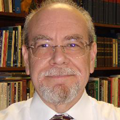
Leading From WHAT Center?
Jeanne P. McLean's seminal work on the role of the academic dean as an act of "leading from the center" is apt and resonates with those of us who have experienced the job. But in the whirlwind of the experience of leading form the center, one may well ask, "the center of what?"
Theological schools carry on their work at the itersection of at least three spheres of influence, and the dean resides at the center of that intersection. The three primary spheres of influence are: (1) the academic guilds of which faculties are a part; (2) the field of higher education, including the accrediting agencies; and (3) the matrix of churches, ecclesiastic bodies, and denominations to which their students are related. These three spheres of influence both support and compete for the theological school in which the dean carries out her or his work. At times these areas compete against the theological school for resources, loyalties, and ideologies. Furthermore, among them, the three spheres of influence may have conflicting interests, leaving the dean feeling like he or she is "caught in the middle."

The specific context of a particular school will, to some degree, determine to what extend each sphere of influence is dominant. In some contexts the academic guild and scholarship may be overwhelmingly influential in the seminary's culture. Faculty ethos, and mission. In another the influence of the denomination and constituents may exert influence above that of scholarship, or even, of academic achievement. It may be that ministry service, practical leadership preparation, and the influence of the churches or the needs of denominations may be preeminent. Over time a dean may experience the influence of one sphere wane while another takes precedence. Certainly when re-accreditation visits loom close on the calendar, the concerns of accrediting bodies becomes the predominant focus for a school.
For seminaries, arguably, the most significant spheres of influence (depicted in the graphic within the box representing the seminary) are, in order: (1) the influence of the academic guilds through the presence and work of Faculty in the seminary culture and its influence on the curriculum; (2) the influence of the field of higher education related to institutional organization, validation, and legitimacy; and lastly, (3) the influence of the churches seminaries purportedly exist to serve. Representative players from within those fields are the direct concern of the academic dean, who must balance the stewardship of the office, and the resources of the seminary, with the demands of each.
So, the dean is at the center, but at the center of what? As McLean noted," While these spheres of responsibility are not unrelated, each has its own distinct and considerable demands. At this center where activities converge, the stresses and frustrations, the challenges and possibilities of the deanship reside."(1)
FRUSTRATIONS
Within this framework, deans can face multiple frustrations:
- The demands of Faculty to give preeminence and make accommodations for personal pursuits of scholarly activities (sabbaticals, time away from teaching in the classroom, etc.)
- The demands of the administration to keep the school viable and work with limited resources.
- The demands of religious leaders for accountability, or for accommodation of perceived or actual needs of churches
- The demands of religious leaders to highlight and address certain issues (social, doctrinal, theological, political, etc.)
- The demands of students to accommodate, well, just about anything.
- The demands of religious bodies to produce seminarians fully prepared for the complexities of ministry.
- The demands of accrediting bodies to demonstrate compliance on multiple concerns, many of which consume resources that may rob the institution from focusing on its primary mission.
CHALLENGES
Given the reality of leading from the center, and being in a position of needing to address all spheres of influence to some extent, deans face certain challenges few in the organization do.
- Holding to the integrity of the work of the school given the competing voices and concerns that influence the system.
- Appreciating the perspectives and speaking the language of the constituents from the three fields of influence.
- Interpreting the significance and valid concerns of each field to the constituents of the others.
- Interpreting the work of the school to constituents in each sphere with transparency and integrity.
- Navigating the cloudy intersections the fields create in the space the dean resides.
- Presiding as chief academic officer working to ensure students are prepared for the work of ministry, in a context that is better designed to prepare academics and students to be, well, academics and students.
Deans do lead from the center, as Jeanne McLean rightly described. It is important for deans, however, to once in a while take stock of where they are situated and ask themselves the question, "From the center of what?"
Questions:
Which field is most influential in your context? Which field of influence most informs your work? Which field of influence demands most attention of you? In which field of influence are you most comfortable leading? Is there one field you tend to neglect? Is there a "balance" that needs to be achieved among the three competing fields in your context?
(1) McLean, Jeanne P. 1999. Leading from the center : the emerging role of the chief academic officer in theological schools. Atlanta: Scholars Press, 1999.